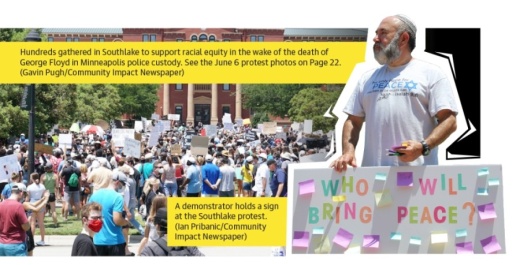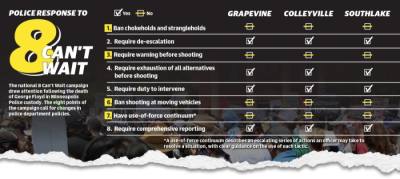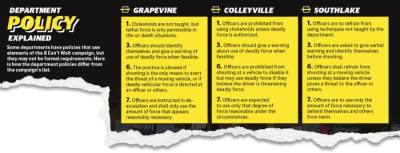The Grapevine, Colleyville and Southlake police departments have all published responses to each of the eight points brought up by 8 Can’t Wait, a national campaign calling for police reform.
8 Can’t Wait garnered widespread attention in the weeks following the death of George Floyd in Minneapolis police custody.
Some of the policies referenced in the campaign include banning chokeholds and strangleholds, requiring the use of de-escalation techniques, requiring a warning before shooting and requiring officers exhaust all other options before shooting.
Other points include tasking officers with the duty to intervene if they observe another officer using excessive force, banning police shooting at moving vehicles, requiring a use-of-force continuum and requiring comprehensive reporting when force is used or threatened.
Grapevine Police Chief Mike Hamlin said his team decided to publicize the department’s policies in response to the campaign after receiving questions from numerous residents.
“They were asking policy-related questions around force application, ... [and] certainly [around] the points in the 8 Can’t Wait [platform],” Hamlin said.
Hamlin said the department has begun talking about additional training it may require for its officers.
“We’ve got an effort going to bring in a trainer and spend some time going through de-escalation training again. We’ll go back through racial profiling [trainings],” Hamlin said.
Grapevine was the site of at least two demonstrations following Floyd’s death: one on Main Street and another at SH 26. Hamlin said those demonstrations were largely peaceful and had widespread community support.
Southlake also had its own protest, which attracted between 1,000-1,500 attendees on June 6 and garnered regional attention. The event was organized by Carroll ISD students and headed by Estela Romero, who said she coordinated with Southlake police to ensure the event remained peaceful.
“In the week leading up to [the protest], we had the benefit in our city of watching as protests took place in other cities and kind of learning from what happened in those cities,” Southlake Department of Public Safety Assistant Police Chief Ashleigh Casey said.
In a video conference for the Mayor’s Alliance for Unity and Culture, Southlake Mayor Laura Hill said the city still has work ahead.
“We have to keep engaging. There’s so much more to do. I’m proud of what we have done, but we absolutely have a lot more to do,” Hill said.
In terms of police policy, Casey said the Southlake Police Department is one of only a handful in Texas accredited by the Commission on Accreditation for Law Enforcement Agencies, or CALEA. Accreditation through agencies such as CALEA helps ensure that the department stays current with industry standards.
“[There are] over 1,100 standards and sub standards that we voluntarily adhere to because those are denoted by CALEA as best practices in the law enforcement profession,” Casey said.
The Colleyville Police Department is accredited through the Texas Police Chiefs is also working on its CALEA accreditation, Chief Michael Miller said.
“While accreditation does not guarantee an agency won’t make a mistake, it does ensure that the agency has studied the list of critical issues, developed policies and procedures to address them, and has systems in place to identify and correct problems,” Miller said in a statement.







